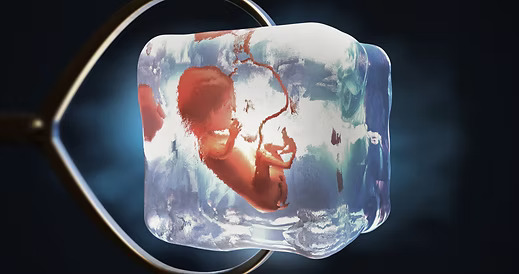
Embryo Freezing
Embryo Freezing: Maximizing Your IVF Success and Future
Family Building
Embryo freezing is a well-established and vital part of the
In Vitro Fertilization (IVF) process. It allows you to safely preserve viable
embryos for future use, increasing the chances of achieving a pregnancy from a
single egg retrieval cycle. This technology offers flexibility, peace of mind,
and hope for growing your family when the time is right for you.
What is Embryo Freezing?
During an IVF cycle, eggs are retrieved and fertilized with
sperm to create embryos. Embryo freezing involves carefully preserving these
embryos by cooling them to very low temperatures. This process, known as cryopreservation,
effectively pauses their development. They can be stored for many years and
thawed later for a frozen embryo transfer (FET) cycle.
The Advanced Freezing Technique: Vitrification
Our clinic uses a state-of-the-art flash-freezing method
called vitrification. This technique is incredibly fast, preventing
the formation of damaging ice crystals inside the embryo. Vitrification has
significantly improved embryo survival rates after thawing, making frozen
embryo transfers highly successful.
Key Benefits of Embryo Freezing
1. Maximizes a Single IVF Cycle
If multiple healthy embryos develop from one egg retrieval, freezing allows you
to preserve them for future attempts. This means you may not need to undergo
another stimulating egg retrieval procedure for a second or third child.
2. Enables a Healthier Transfer
After egg retrieval and stimulation, the uterine environment may not be ideal
for implantation. Freezing embryos allows your body time to recover. In a
subsequent Frozen Embryo Transfer (FET) cycle, your uterus can be prepared with
hormone medication to create an optimal, receptive environment, which can
potentially increase the chance of pregnancy.
3. Supports Preimplantation Genetic Testing (PGT)
If you choose to have your embryos screened for chromosomal abnormalities
(PGT), freezing is essential. It gives our lab the time needed to receive and
analyze the genetic results, allowing your doctor to select the healthiest
embryo for transfer.
4. Provides Future Family Options
Frozen embryos offer flexibility for family planning years later. They also
provide a crucial option for patients facing medical treatments like
chemotherapy or radiation that could affect fertility.
5. Reduces Risk of Ovarian Hyperstimulation Syndrome
(OHSS)
In a cycle where there is a high risk of OHSS, freezing all embryos and
postponing the transfer allows the body to return to a normal hormonal state,
significantly reducing this risk.
The Embryo Freezing & Thawing Process: A Step-by-Step
Guide
- Embryo
Development: After fertilization in our lab, embryos are cultured
for 5-6 days until they reach the blastocyst stage, which is ideal for
freezing.
- Cryopreservation: Embryos
are treated with a special solution (cryoprotectant) and then rapidly
frozen using the vitrification method.
- Secure
Storage: The frozen embryos are safely stored in labelled
containers within secure tanks of liquid nitrogen at our accredited
laboratory.
- The
Frozen Embryo Transfer (FET) Cycle: When you are ready, a chosen
embryo is thawed. The thawing process is carefully controlled, and viable
embryos are transferred into your uterus during a simple procedure similar
to a pap smear.
Frequently Asked Questions
- How
long can embryos be frozen?
Scientifically, embryos can remain viable indefinitely when stored correctly. Legal storage limits can vary by location, and our team will provide you with all the necessary information. - What
is the survival rate of frozen embryos?
Thanks to vitrification, survival rates for high-quality blastocysts are typically very high, often exceeding 95%. - Are
frozen embryo transfers successful?
Yes. In many cases, FET cycles can be equally or even more successful than fresh transfers because the uterine lining is often more receptive.
Your Journey, Our Expertise
Our team of fertility specialists and embryologists are
highly experienced in all aspects of embryo cryopreservation. We are committed
to providing the highest standard of care and using the most advanced
technology to give your embryos the best chance for future success.
If you have questions about embryo freezing and how it
fits into your treatment plan, please contact us to speak with a specialist.
